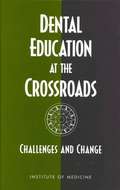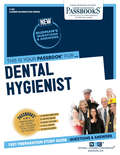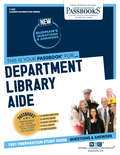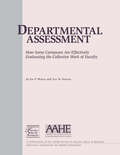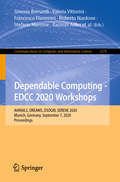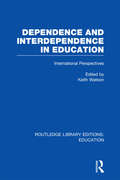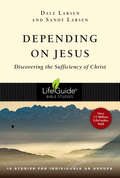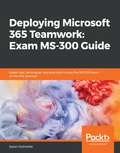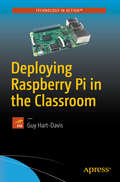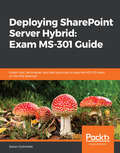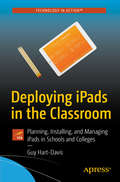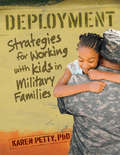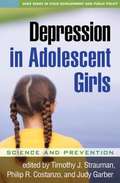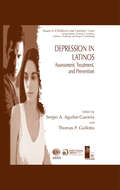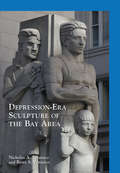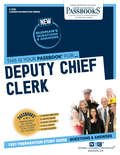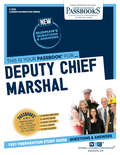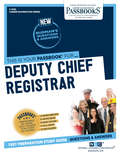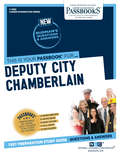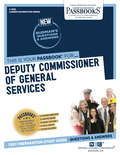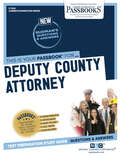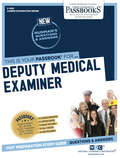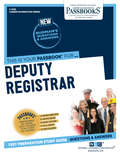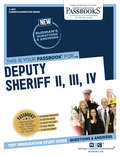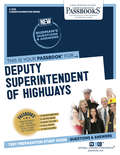- Table View
- List View
Dental Education at the Crossroads: Challenges and Change
by Committee on the Future of Dental EducationSix dental schools have closed in the last decade and others are in jeopardy. Facing this uncertainty about the status of dental education and the continued tension between educators and practitioners, leaders in the profession have recognized the need for purpose and direction.This comprehensive volume--the first to cover the education, research, and patient care missions of dental schools--offers specific recommendations on oral health assessment, access to dental care, dental school curricula, financing for education, research priorities, examinations and licensing, workforce planning, and other key areas.Well organized and accessible, the book Recaps the evolution of dental practice and education. Reviews key indicators of oral health status, outlines oral health goals, and discusses implications for education. Addresses major curriculum concerns. Examines health services that dental schools provide to patients and communities. Looks at faculty and student involvement in research. Explores the relationship of dental education to the university, the dental profession, and society at large. Accreditation, the dental workforce, and other critical policy issues are highlighted as well.Of greatest interest to deans, faculty, administrators, and students at dental schools, as well as to academic health centers and universities, this book also will be informative for health policymakers, dental professionals, and dental researchers.
Dental Hygienist: Passbooks Study Guide (Career Examination Series)
by National Learning CorporationThe Dental Hygienist Passbook® prepares you for your test by allowing you to take practice exams in the subjects you need to study. It provides hundreds of questions and answers in the areas that will likely be covered on your upcoming exam.
Department Library Aide: Passbooks Study Guide (Career Examination Series)
by National Learning CorporationThe Department Library Aide Passbook® prepares you for your test by allowing you to take practice exams in the subjects you need to study. It provides hundreds of questions and answers in the areas that will likely be covered on your upcoming exam, including but not limited to: clerical operations with letters and numbers; coding/decoding information; name and number checking; office record keeping; understanding and interpreting written material; and more.
Departmental Assessment: How Some Campuses Are Effectively Evaluating the Collective Work of Faculty
by Jon F. Wergin Judi N. SwingenReports the results of a survey to locate campus evaluation policies and practices that encourage constructive change in departments and a stronger culture of collective responsibility for the unit's success. Specific recommendations are offered–ideas that could aid in creating a more "self-regarding" institution, stronger and more widely accepted methods for evaluating departments and collectives, and eventually greater flexibility for departmental faculty. The authors review materials from 130 institutions, following visits to eight campuses, and identify the key components: (1) the degree to which the organizational and cultural setting promotes a conducive atmosphere for evaluation; (2) the credibility and fairness of evaluation policies and practices; and (3) the validity and reliability of evaluation standards, criteria, and measures.Supported by the Pew Charitable Trusts.
Dependable Computing - EDCC 2020 Workshops: AI4RAILS, DREAMS, DSOGRI, SERENE 2020, Munich, Germany, September 7, 2020, Proceedings (Communications in Computer and Information Science #1279)
by Daniel Schneider Simona Bernardi Valeria Vittorini Francesco Flammini Roberto Nardone Stefano Marrone Rasmus Adler Philipp Schleiß Nicola Nostro Rasmus Løvenstein Olsen Amleto Di Salle Paolo MasciThis book constitutes refereed proceedings of the Workshops of the 16th European Dependable Computing Conference, EDCC: Workshop on Articial Intelligence for Railways, AI4RAILS 2020, Worskhop on Dynamic Risk Management for Autonomous Systems, DREAMS 2020, Workshop on Dependable Solutions for Intelligent Electricity Distribution Grids, DSOGRI 2020, Workshop on Software Engineering for Resilient Systems, SERENE 2020, held in September 2020. Due to the COVID-19 pandemic the workshops were held virtually. The 12 full papers and 4 short papers were thoroughly reviewed and selected from 35 submissions. The workshop papers complement the main conference topics by addressing dependability or security issues in specic application domains or by focussing in specialized topics, such as system resilience.
Dependence and Interdependence in Education: International Perspectives (Routledge Library Editions: Education)
by Keith WatsonThis volume provides an international perspective on educational dependency in considering both theories and actual developments throughout the world. Some less developed countries, in expanding their education systems, have emulated Western academic-style systems and have increased their dependence on Western models in various respects including examination validation. Others have deliberately avoided this path and have experimented with systems more ‘relevant’ to development, often in a radical way. At a theoretical level, Marxist and neo-Marxist development theorists argue that education systems dependent on the West are evidence of economic dependency and confirmation of Marxist development theories; while others argue that the evidence suggests an interdependent world and that dependency theories do not apply in education.
Depending on Jesus: Discovering the Sufficiency of Christ (LifeGuide Bible Studies)
by Sandy Larsen Dale LarsenAs believers know we have to depend on Jesus for many things: for salvation, for guidance, for forgiveness, for daily needs. But to depend on Christ for everything? Excluding nothing? It's a scary—but also a profoundly biblical—idea. In this ten-session LifeGuide® Bible Study, you'll explore instances of biblical people learning that they could rely on Christ to see them through, even when all other avenues of help failed. They encountered every kind of obstacle: hostility, loneliness, injustice, failure, and other seemingly impossible difficulties. Just as they discovered that Christ is sufficient for any and all circumstances, you will be encouraged to discover the same. For over three decades LifeGuide Bible Studies have provided solid biblical content and raised thought-provoking questions—making for a one-of-a-kind Bible study experience for individuals and groups. This series has more than 130 titles on Old and New Testament books, character studies, and topical studies.
Deploying Microsoft 365 Teamwork: Expert tips, techniques, and practices to pass the MS-300 exam on the first attempt
by Aaron GuilmettePrepare to achieve Microsoft 365 Certified Teamwork Administrator Associate certification by learning essential SharePoint Online concepts, and answering self-assessment questions to test your knowledge Key Features Cover essential topics based on the MS-300 exam, and learn with the help of detailed explanations Understand the collaborative features of SharePoint, both on-premises and as part of the Office 365 service Work through practice questions relating to business use cases for SharePoint Server and Online Book Description The Microsoft MS-300 exam is designed to test the knowledge and skills of administrators in deploying, configuring, and managing SharePoint Online, SharePoint Server, SharePoint Hybrid, OneDrive for Business, and Teams. This book offers up-to-date coverage of the important topics based on the MS-300 exam and features question answers and insider tips to help you prepare for certification. Written in a clear, succinct way, the book starts by helping you configure and manage SharePoint Online. You'll then delve into OneDrive for Business, right from managing users and groups, through to monitoring sharing and security. Further chapters will guide you through working with Teams, with an emphasis on managing identity authentication, resolving issues with the service, and even observing usage patterns. Later, you'll get up to speed with workload integrations, covering the Yammer business communications platform, before moving on to understand how to integrate Microsoft Stream with SharePoint, Teams, and Yammer. Finally, you'll learn to develop data governance and user adoption strategies. By the end of this book, you'll be well-versed with SharePoint Online and have learned the essential techniques and concepts you need to know in order to pass the MS-300 certification exam. What you will learn Discover the different Microsoft services and features that make up Office 365 Configure cloud services for your environment and extend your infrastructure's capabilities Understand site architecture, site settings, and hub settings in SharePoint Online Explore business connectivity services for view and access options in SharePoint Online Configure Yammer to integrate with Office 365 groups, SharePoint, and Teams Deploy SharePoint Online, OneDrive for Business, and Microsoft Teams successfully, including bots and connectors Who this book is for This book is for SharePoint developers, administrators, or those who want to explore Microsoft's teamwork solution platforms and pass the certification exam to boost their career as Microsoft Teamwork Administrator Associates. Anyone who has achieved Microsoft's entry-level admin certification and wants to progress to intermediate certification will also find this book useful.
Deploying Raspberry Pi in the Classroom
by Guy Hart-DavisLearn how to deploy Raspberry Pi computers in a classroom or lab situation and how to navigate the hardware and software choices you face. Deploying Raspberry Pi in the Classroom equips you with the skills and knowledge to plan and execute a deployment of Raspberry Pi computers in the classroom. Teachers and IT administrators at schools will see how to set up the hardware and software swiftly on your own or with the help of your students. Step-by-step instructions and practical examples walk you through building your Raspberry Pi workstations and your network, managing the computers and the network, and troubleshooting any problems that arise. This book offers several points to involve your students through hands-on activities. These activities are designed to benefit your beginner and older or more able students alike. Make Deploying Raspberry Pi in the Classroom a part of you instructional library today. What you will learn Put an easily-manageable computer on each desk for students to learn Internet use and essential office software skills Image, configure, and plan a classroom deployment of Raspberry Pi computers Manage your classroom Raspberry Pi computers and keeping them up and running smoothly and efficiently Who this book is for Primary audience would be teachers and IT administrators at schools or colleges. It will also appeal to administrators at social clubs or organizations that provide less formal tuition or simply provide Internet access.
Deploying SharePoint Server Hybrid: Expert tips, techniques, and best practices to pass the MS-301 exam on the first attempt
by Aaron GuilmetteDiscover expert guidance to achieve the Microsoft 365 Certified Teamwork Administrator Associate certification and become proficient in working with SharePoint Server hybrid configuration Key Features Discover how to deploy, configure, and administer the SharePoint ecosystem Learn how to map traditional Microsoft services to a cloud-services model Understand the security and governance requirements and configurations of your organization Book Description The Microsoft MS-301 exam validates the knowledge and skills you need for deploying, configuring, and managing SharePoint Server and SharePoint Hybrid, as well as migrating to SharePoint Online. This SharePoint book offers complete, up-to-date coverage of the MS-301 exam syllabus, helping you take the exam with confidence, fully equipped to pass the first time. With the help of clear and succinct explanations, self-assessment questions, tips, and mock exams with detailed answers, this book covers the configuration of SharePoint Server and SharePoint Hybrid and the process of migrating to SharePoint Online. This study guide is divided into three modules. The first two modules focus on strategies and techniques to configure and manage SharePoint on-premises and hybrid scenarios, where you'll get to grips with essential concepts relating to SharePoint deployments, such as authentication, Business Connectivity Services (BCS), and the data gateway. The third module will take you through migration methods and strategies. Each chapter includes practice questions to test your knowledge of the concepts covered. By the end of this book, you'll have learned everything you need to pass the MS-301 certification exam, and you'll be able to use this reference guide for your administration tasks. What you will learn Understand the collaborative features of SharePoint Server technologies Deploy and configure SharePoint Server 2019 Configure and manage site collections and hub site settings and security Use migration tools in SharePoint to manage data migration Explore BCS for working with external data sources Get to grips with different types of authentication available in SharePoint Online Who this book is for The book is for intermediate administrators who want to pass the MS-301 exam and achieve the Microsoft 365 Certified: Teamwork Administrator Associate certification. Anyone looking to learn about deploying, configuring, and administering SharePoint, OneDrive, and Teams will find this book useful. The book assumes a working knowledge of popular Microsoft services and a basic understanding of working with the SharePoint ecosystem.
Deploying iPads in the Classroom
by Guy Hart-DavisMaster the skills and knowledge to plan and execute a deployment of iPads that will suit your school and your classroom. This book helps you evaluate your various options for deploying iPads--from configuring the tablets manually, through using Apple Configurator for imaging tablets, to subscribing to the heavy-duty Apple School Manager web service--and then shows you how to put your chosen approach into practice. Step-by-step instructions and practical examples walk you through the key questions you need to answer to get the most from your IT investment and then show you how to turn your decisions into deeds. The iPad is a wonderful device for helping students to study more comfortably and learn more quickly. Apple's popular tablet enables you to put in each student's hands a full-power computer that enables her to access resources both on the school's network and on the Internet; communicate via email, instant messaging, and video chat; and create digital content that she can submit effortlessly to your online marking system. Students love using the iPad--perhaps even more than teachers do! What You'll Learn Plan your iPad deployment and choose the right iPad models, accessories, and apps Image, configure, and deploy iPads in your classroom Review tips, tricks, and techniques for managing iPads and keeping your digital classroom running smoothly Who This Book Is For Teachers and IT administrators at schools or colleges, and administrators and organizers in other bodies that need to deploy iPads en masse to conference attendees or hotel visitors
Deployment
by Karen PettyChildren with parents in the military face unfamiliar and complicated emotions. This comprehensive handbook is for civilians and military personnel who work with or care for children who experience separation through deployment, death, or divorce. Written by an internationally known, hands-on trainer and presenter in the field, this book contains theory-based, practice-driven strategies for handling separation and helping young through elementary-age children move forward and live full lives.
Depression in Adolescent Girls
by Philip Costanzo Timothy StraumanCompared to boys, adolescent girls face an increased risk of depression and repeated recurrences throughout adulthood. This unique volume presents a comprehensive multidisciplinary framework for understanding how girls become vulnerable to mood disorders and how that vulnerability might be reduced. The contributors are leading scholars at the cutting edge of theory, research, intervention, and policy. The chapters cover new developments in the science of depression from genes to biological, psychological, and social processes and explore how the research is being translated into innovative prevention efforts.
Depression in Latinos
by Thomas P. Gullotta Sergio A. Aguilar-GaxiolaDepression ranks as a leading mental health problem among Hispanic immigrants and their US-born children. And a wide array of issues - starting with the widespread stereotype of the "illegal immigrant" - makes the Latino experience of this condition differ from that of any other group. Depression in Latinos consolidates the conceptual, diagnostic, and clinical knowledge based on this salient topic, providing coverage from prevalence to prevention, from efficient screening to effective interventions. In this concise yet comprehensive volume, leading clinicians, researchers, and academics offer extensive research and clinical findings, literature reviews (e.g., an in-depth chapter on the Mexican American Prevalence and Services Survey), and insights gathered from first-hand experience in clinical practice. Perceptive information is offered on the most urgent and complex issues on depression in this diverse and dynamic population, including: (1) The impact language, culture, and societal factors have on depression and its diagnosis. (2) The most relevant assessment instruments. (3) How depression manifests among Latino children, youth, and seniors as well as in Latinas. (4) The relationship between depression and substance abuse. (5) The most effective evidence-based treatment methods. (6) The efficacy of interventions for depression at the community level. Depression in Latinos is vital reading for clinicians, counseling and school psychologists, psychiatrists, clinical social workers, and public health professionals interested in providing their Hispanic clients with the most effective treatment possible. In addition, its coverage of the broader issues of access to care makes this volume essential reading for mental health administrators, volunteer/outreach agencies, and policymakers.
Depression-Era Sculpture of the Bay Area
by Betty S. Veronico Nicholas A. VeronicoThe Great Depression was a terrible blow for the Bay Area’s thriving art community. A few private art projects kept a small number of sculptors working, but for the majority, prospects of finding new commissions were grim. By the mid-1930s, Pres. Franklin D. Roosevelt’s New Deal program had gathered steam, and assistance was provided to the nation’s art community. Salvation came from the Works Progress Administration (WPA), which employed thousands of artists to produce sculpture for public venues. The Bay Area art community subsequently benefitted from the need to fill the then-forthcoming Golden Gate International Exposition (GGIE) with sculpture of all shapes and sizes. As bad as the Depression was, its legacy more than 80 years on is one of beauty. The Bay Area is dotted with sculpture from this era, the majority of it on public display. Depression-Era Sculpture of the Bay Area is a visual tour of this artistic bounty.
Deputy Chief Clerk: Passbooks Study Guide (Career Examination Series)
by National Learning CorporationThe Deputy Chief Clerk Passbook® prepares you for your test by allowing you to take practice exams in the subjects you need to study. It provides hundreds of questions and answers in the areas that will likely be covered on your upcoming exam, including but not limited to: office and secretarial practices; public and interpersonal relations; preparation of written material; reading comprehension; arithmetic reasoning; and more.
Deputy Chief Marshal: Passbooks Study Guide (Career Examination Series)
by National Learning CorporationThe Deputy Chief Marshal Passbook® prepares you for your test by allowing you to take practice exams in the subjects you need to study. It provides hundreds of questions and answers in the areas that will likely be covered on your upcoming exam.
Deputy Chief Registrar: Passbooks Study Guide (Career Examination Series)
by National Learning CorporationThe Deputy Chief Registrar Passbook® prepares you for your test by allowing you to take practice exams in the subjects you need to study. It provides hundreds of questions and answers in the areas that will likely be covered on your upcoming exam.
Deputy City Chamberlain: Passbooks Study Guide (Career Examination Series)
by National Learning CorporationThe Deputy City Chamberlain Passbook® prepares you for your test by allowing you to take practice exams in the subjects you need to study. It provides hundreds of questions and answers in the areas that will likely be covered on your upcoming exam, including but not limited to: general accounting and auditing; understanding and interpreting written and tabular material; supervision; and more.
Deputy Commissioner of General Services: Passbooks Study Guide (Career Examination Series)
by National Learning CorporationThe Deputy Commissioner of General Services Passbook® prepares you for your test by allowing you to take practice exams in the subjects you need to study. It provides hundreds of questions and answers in the areas that will likely be covered on your upcoming exam, including but not limited to: preparing written material; understandind and interpreting written material; administration; organizing data into tables and records; and other related areas.
Deputy County Attorney: Passbooks Study Guide (Career Examination Series)
by National Learning CorporationThe Deputy County Attorney Passbook® prepares you for your test by allowing you to take practice exams in the subjects you need to study. It provides hundreds of questions and answers in the areas that will likely be covered on your upcoming exam, including but not limited to: legal principles; legal aptitude; legal reading comprehension; legal terminology; and more.
Deputy Medical Examiner: Passbooks Study Guide (Career Examination Series)
by National Learning CorporationThe Deputy Medical Examiner Passbook® prepares you for your test by allowing you to take practice exams in the subjects you need to study. It provides hundreds of questions and answers in the areas that will likely be covered on your upcoming exam.
Deputy Registrar: Passbooks Study Guide (Career Examination Series)
by National Learning CorporationThe Deputy Registrar Passbook® prepares you for your test by allowing you to take practice exams in the subjects you need to study. It provides hundreds of questions and answers in the areas that will likely be covered on your upcoming exam.
Deputy Sheriff II, III, IV: Passbooks Study Guide (Career Examination Series)
by National Learning CorporationThe Deputy Sheriff II, III, IV Passbook® prepares you for your test by allowing you to take practice exams in the subjects you need to study. It provides hundreds of questions and answers in the areas that will likely be covered on your upcoming exam, including but not limited to: educating and interacting with the public; state law and investigative techniques; preparing written material; supervision; service and enforcement of civil and family court processes; and more.
Deputy Superintendent of Highways: Passbooks Study Guide (Career Examination Series #C-2319)
by National Learning CorporationThe Deputy Superintendent of Highways Passbook® prepares you for your test by allowing you to take practice exams in the subjects you need to study. It provides hundreds of questions and answers in the areas that will likely be covered on your upcoming exam, including but not limited to: Administrative supervision; Methods and materials of road reconstruction; Street maintenance, reconstruction and repair, including sidewalks and curbs; Occupational, environmental, public, traffic control and work zone safety practices; and more.
